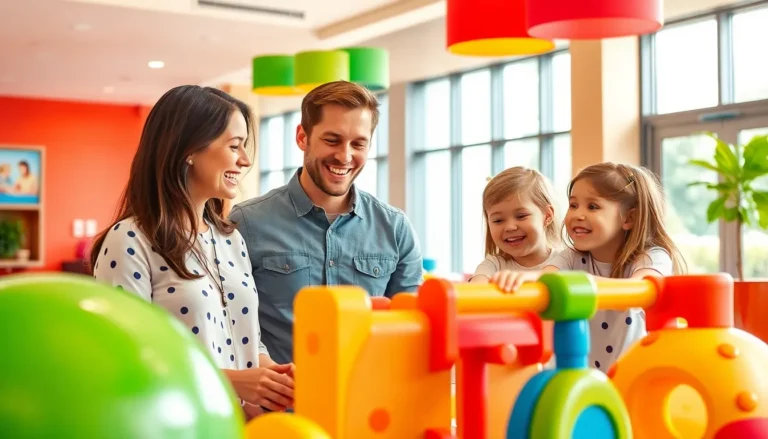Table of Contents
ToggleDivorce might feel like the end of the world, but for parents, it’s just the beginning of a new adventure—co-parenting! Imagine navigating a rollercoaster where the only safety harness is communication and a dash of humor. It’s not always easy, but with the right mindset, it can turn into a wild ride full of unexpected twists and turns.
Understanding Co Parenting After Divorce
Co-parenting after divorce involves sharing responsibilities and nurturing children collaboratively. It emphasizes cooperation between parents even in challenging situations.
Definition of Co Parenting
Co-parenting refers to the joint raising of children by separated or divorced parents. This arrangement focuses on effective communication, shared decision-making, and a commitment to the children’s welfare. Parents engage in discussions regarding education, health care, and daily activities, ensuring children feel secure and supported. Legal agreements or informal understandings often guide co-parenting practices. Stability encourages children’s emotional and psychological growth, contributing to their well-being.
Importance of Co Parenting
Co-parenting plays a crucial role in children’s adjustment post-divorce. It fosters a supportive environment, helping children maintain strong relationships with both parents. Effective collaboration nurtures positive communication skills while modeling conflict resolution strategies. Emotional health improves when parents prioritize children’s needs over personal differences. A commitment to shared parenting responsibilities enhances consistency in children’s routines, contributing to their overall development. Ultimately, smooth co-parenting can lead to healthier family dynamics and stronger bonds among family members.
Challenges of Co Parenting After Divorce

Co-parenting after divorce presents several challenges. Parents often face obstacles in maintaining effective communication and nurturing their children’s emotional health.
Communication Barriers
Communication barriers create significant hurdles. Misunderstandings frequently occur between parents, leading to conflict. Parents may struggle to be open and transparent, particularly when emotions run high. Non-verbal cues sometimes get misinterpreted, adding to miscommunication. Inconsistent information about schedules and decisions can confuse children. Establishing a clear communication plan helps minimize these barriers. Utilizing technology, such as co-parenting apps, can streamline communication. Proactive discussions about parenting styles and expectations can foster better understanding.
Emotional Strain on Children
Emotional strain affects children deeply during and after a divorce. It often leads to feelings of confusion and insecurity. Children might grapple with feelings of loyalty, especially if parents express conflicting views. Adjusting to new family dynamics can be challenging, impacting their mental health. Developing coping strategies becomes essential to help them navigate these emotions. Encouraging open dialogue allows children to express their feelings. Maintaining routines fosters a sense of stability amid change. Prioritizing children’s emotional needs significantly contributes to their overall adjustment and well-being.
Strategies for Effective Co Parenting
Effective co-parenting relies on strong communication and thorough planning. By implementing these strategies, parents can foster a healthier environment for their children.
Establishing Clear Communication
Clear communication serves as a foundation for effective co-parenting. Parents should prioritize open dialogue to minimize misunderstandings. Utilize tools like text messages or co-parenting apps to share schedules and updates in real-time. Emphasizing respect during discussions can enhance collaboration. Setting regular check-ins allows both parents to address concerns promptly. Encouragement of children’s emotional expression also plays a critical role in their adjustment process. With clear communication, parents create a supportive atmosphere, which mitigates stress for both parents and children.
Creating a Co Parenting Plan
A co-parenting plan acts as a roadmap for shared responsibilities. Both parents should collaborate on essential aspects like custody schedules, holiday arrangements, and decision-making processes. Clearly outlining each parent’s role and responsibilities ensures accountability. Include specifics about communication methods to maintain consistency. Address potential challenges upfront, allowing for flexibility while adhering to this plan. Regularly revisiting and adjusting the plan can accommodate evolving needs as children grow. A well-structured co-parenting plan reinforces stability and security, beneficial for children’s emotional well-being.
Benefits of Successful Co Parenting
Successful co-parenting fosters a nurturing environment essential for children’s development. Strong co-parenting strategies not only benefit children but also enhance parental relationships.
Positive Impact on Children
Co-parenting supports children’s emotional stability, providing a sense of security. Research shows consistent parenting positively influences child behavior and mental health. Maintaining routines and clear communication helps children feel less anxious about transitions. Frequent interactions with both parents strengthen their emotional bonds. Children thriving in a stable environment exhibit improved academic performance and better social skills. Parents working together reduce confusion and emotional distress for their kids. They also model effective conflict resolution, teaching valuable life skills to their children.
Improved Parental Relationships
Co-parenting strengthens communication between parents, often resulting in enhanced relationships. Regular check-ins and respectful dialogue create a foundation of mutual respect. Collaboration on parenting responsibilities fosters teamwork, leading to a healthier co-parenting dynamic. Sharing triumphs and challenges builds camaraderie among parents, reducing resentment. By focusing on children’s well-being, parents align their goals, facilitating joint decision-making. This shared commitment often leads to more amicable interactions both in and out of parental duties. Ultimately, improved relationships among co-parents create a positive environment for both parents and children alike.
Resources for Co Parents
Accessing the right resources significantly enhances the co-parenting experience. Utilizing support groups and educational materials provides essential tools for navigating shared responsibilities.
Support Groups and Counseling
Joining support groups creates a network for co-parents to share experiences and strategies. Many communities offer local groups that provide emotional support and practical advice. Online forums also exist, allowing parents to connect and learn from others in similar situations. Counseling can assist families in addressing unresolved conflicts, promoting healthy communication. Professional guidance enables parents to develop effective co-parenting strategies tailored to their unique dynamics.
Educational Materials
Utilizing educational materials equips co-parents with knowledge and skills. Numerous books and articles focus on co-parenting techniques and strategies, offering insights on fostering cooperation. Workshops and seminars often provide interactive learning environments where parents can build connections. Online resources like podcasts and webinars present flexible options for busy parents to engage with relevant topics. Information about child development helps co-parents understand their children’s needs during transitions, further supporting effective parenting strategies.
Co-parenting after divorce can be a complex yet rewarding journey. By prioritizing communication and collaboration parents can create a nurturing environment for their children. Embracing the challenges and seeking support through resources and community can lead to healthier family dynamics.
It’s essential to remain flexible and open to change as circumstances evolve. With a commitment to the children’s well-being and a focus on mutual respect, parents can foster strong relationships that benefit everyone involved. Ultimately, navigating this path with patience and understanding can transform the co-parenting experience into a positive chapter for both parents and children.







